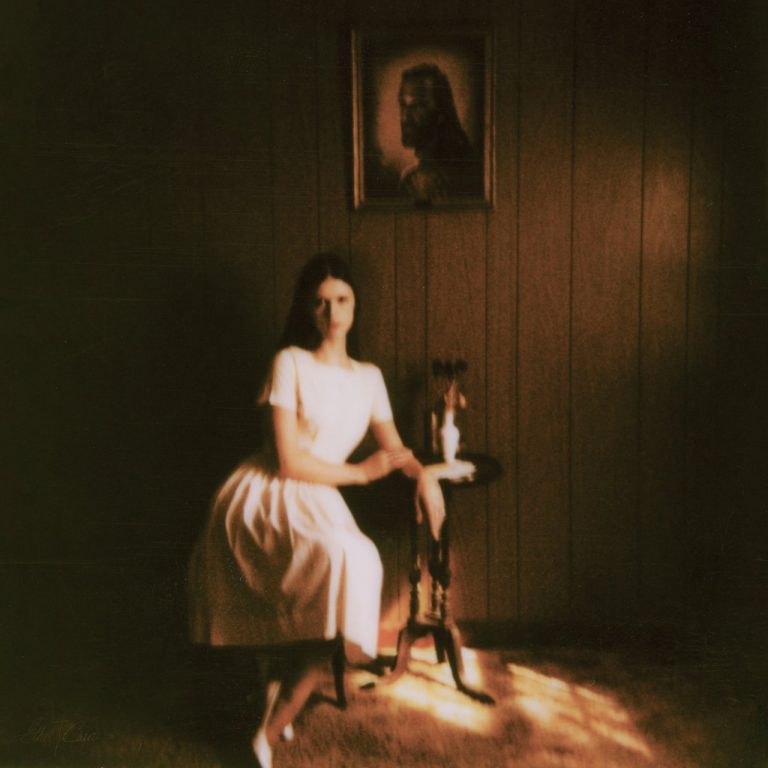Hayden Silas Andhedönia – who performs under the name Ethel Cain – harbours the sort of innate understanding of aesthetical importance in music that only someone who came of age in the 2010s could. On her staggeringly ambitious debut album Preacher’s Daughter she channels a lifetime of trauma, cultural experience and religious battles into a concept album centred around the character Ethel Cain, who runs away from home only to meet a gruesome end at the hands of a cannibalistic psychopath.
Accompanying Cain’s music is a finely-tuned, fittingly macabre aesthetic. On the cover of her 2021 EP Inbred, she stood in front of a crucifix, sporting religious garb, with her forehead tattoo peaking through her hair; recalling in the process a foreboding scene from The Conjuring or Hereditary. On the cover of Preacher’s Daughter, she sits below a painting of Jesus Christ, while wearing a pristinely clean, vintage-style white dress and heels, sat down in her dimly-lit Southern home. The visualisers for the songs from her new LP feature far-away shots of cabins and Churches and grainy shots of American flag clad rooms that despite being seemingly empty have the lights turned on and the ceiling fans whirring. The American Gothic imagery feels not just important and purposeful, but essential and inseparable from the music it accompanies – a mark of a very modern pop star, if ever there was one.
Aside from the heavy, iconoclastic opener “Family Tree (Intro)”, it’s perhaps surprising how peppy the first half of Preacher’s Daughter sounds. “American Teenager” strongly recalls Fearless-era Taylor Swift, fit with references to the “high school football team” and “crying in the bleachers” and, most importantly, boasting an earworm, capital-P Pop chorus. The dark pop-rock fusion “Western Nights”, meanwhile, recalls Ultraviolence-era Lana Del Rey – all the way down to the the romanticising of a Harley-riding, crime-committing bad boy.
These are adept pop songs that showcase a preternatural knack for melody and song-structure, and while their central influences are obvious, they also do a sufficient job of differentiating Cain’s music from that of her idols. “American Teenager” may be chockablock with Swift-isms, but it also hints at far darker truths than were ever explored in “Love Story” or “You Belong With Me”. A strained relationship with Christianity, a young neighbour’s death at war and a physically abusive relationship are all given voice across the song’s six minutes. Meanwhile, the romanticisation of danger, desire and recklessness in “Western Nights” is abruptly interrupted by a stark admission of vulnerability: “I’d hold the gun if you asked me to”, Cain admits, her voice quivering in the process.
That said, Preacher’s Daughter excels when Cain finds a sound that is as heavy and unsettling as the lyrics she pens and the aesthetic she creates. The best song here, “Ptolemaea”, is a compositional masterpiece. As Cain undergoes a drug-induced hallucination, a fly buzzes incessantly in the background, while muffled male cries of “gave you / need you / love you” rise and fade from the forefront. Around the song’s midpoint, Cain begins repeatedly begging “stop”, each cry getting gradually louder than the next until suddenly her cry becomes almost feral – at which point a swirling electric guitar enters, cutting into the mix like a hot knife through butter. It makes for a genuinely spine-tingling moment.
Conversely, just as Preacher’s Daughter soars at its loudest, most claustrophobic moments, so too does it at its most sparse. Following “Ptoelemaea” are two instrumental tracks, “August Underground” and “Televangelism”. The former is supposedly meant to represent Cain’s attempted escape from, and ultimate death at the hands of, her murderous lover; with a sudden loud-quiet dynamic which mimics the reality of our narrator’s failed getaway. The latter, meanwhile, is serene and sombre – led solely by Cain at the piano, it allegorises her ascent to Heaven.
The final two tracks of Cain’s epic debut which clocks in at one hour, 15 minutes in total – finds her reflecting from beyond the grave, and makes for some of the most affecting – and emotionally draining – songwriting of the album. “God loves you, but not enough to save you” she sings on “Sun Bleached Flies”, wrestling with the contradictions of organised religion. “I’m still praying for that house in Nebraska” she admits sorrowfully later on, reflecting on a humble dream of domestic bliss that never came to fruition. What makes the song so painful is the fundamental question that lies at its core: what does it mean to spend your whole life searching for something that ultimately never comes to fruition?
Closer “Strangers” is darker still, with Cain now a “freezer bride” in her killer’s basement before she is devoured “like smoked bovine hide.” “Am I no good? / Am I no good?” she cries repeatedly in the song’s chorus, sounding as though she long ago gave up any hope of finding an answer. Having spent most of the song seeking validation and redemption from both a lover and a religious tradition who refuse to accept her as she is, in the final verse she turns her focus to her mother. “Mama, just now that I love you / And I’ll see you when you get here” are the album’s final lines. Having spent an entire album focusing on the wreckage of her own life, Cain now turns her focus onto the wreckage others are left with in the wake of her leave. With more questions raised than answered, Cain’s unusually ambitious and fully-realised debut somehow leaves listeners craving more in spite of its wonderful, exhausting, 75 minute runtime.

